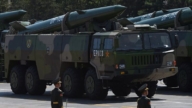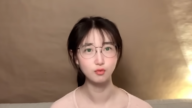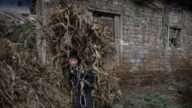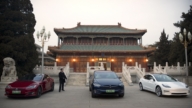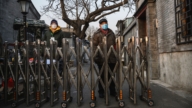【新唐人2013年02月18日讯】“十八”大后,中纪委书记王岐山密切配合习近平的反腐言论,声称对腐败分子“绝不姑息”。而中纪委能不能监督总书记和国家主席﹖地方和部门的纪委能不能监督第一把手﹖前中共总书记赵紫阳的智囊——姚监复提出﹕谁来监督中纪委﹖谁来监督党中央﹖谁来监督中央主席﹖下面请看姚监复的分析评论。
《陈希同亲述》的作者,前中共总书记赵紫阳的智囊姚监复,与多位前中共高官——项南、鲍彤、陈希同接触后,发现他们都对中纪委处理他们的问题存有意见,他们都没有认错。
1989年5月28号,邓小平定调为坏人的中央委员鲍彤,被送往“秦城监狱”。在那里,中纪委的两位局长宣布,鲍彤严重违反刑律,中央政治局决定开除鲍彤党籍,撤消他党内外一切职务。鲍彤当即反驳,认为政治局无权判定他是否违反刑律。
前中共总书记赵紫阳的智囊姚监复:“中纪委对大官的处理,有时候是从政治斗争角度上考虑的。鲍彤说的,政治局先有结论,认为鲍彤触犯刑律,过了几个月后法院才定。这种程度不符合民主法治的程序。”
前中共中央组织部部长安子文,在文革中被毛泽东定为“叛徒”,饱受批判和折磨。文革后,安子文见到鲍彤发出的第一问就是:“谁来监督毛泽东?”
姚监复认为,安子文这一问看透了最高领导人独裁专断,不受任何监督的制度性根本缺陷。
姚监复:“这个问题实际上反映的是一党专政的问题,一党专政就是全党服从中央,下级服从上级,中央又服从政治局,政治局服从常委,常委服从主席。中国变成人治,最高领导人一句话来治,没有监督,这个问题是个很大的问题,反映了中国一党专政的弊病。”
中纪委不能监督总书记和国家主席,地方和部门的纪委也不能监督第一把手。而对于底层,中纪委的权力过于强大,自身又不受监督,制造出无数冤假错案。
大连金州工业所翻译关春荣,遭到所长程绍崇的毒打致残。关春荣多次上诉中纪委,却一再被抓回大连遭受迫害。中纪委一位刘姓官员对关春荣扬言:“我就代表党中央。你告到中央也没用!”“你再来告,我还抓你。”
另一个典型案例是辽宁锦州的访民王玉萍,她从1977年持续上访,至今30年没有结果,2003年,因为中纪委办错案,王玉萍还被无辜劳教18个月。
姚监复认为,如果中纪委不能治理腐败,只能充当权力斗争“借刀杀人”的工具,和充当冤假错案的制造者,那么中纪委也应该成为中共制度改革的一部分。
姚监复:“谁来监督中纪委,谁来监督党中央,谁来监督中央主席,这个问题牵扯到一党专政到底是中国模式、中国道路、中国经验?还是中国的教训?不受监督的绝对权力必然导致绝对腐败。”
现在主持中纪委工作的王岐山,多次向外界显示反腐的决心和魄力。但姚监复认为这远远不能解决腐败问题。他认为,中共当前的腐败是整体性的“癌扩散”,王岐山能否“主刀”切除中共的腐败毒瘤?不仅老百姓,就连中共自己也不相信。
采访/朱智善 编辑/许旻 后制/萧宇
Who Can Supervise the Central Discipline Inspection Commission?
Since assuming office, Xi Jinping, new leader of the Chinese
Communist Party (CCP), has touted combating corruption.
Wang Qishan, new chief of the CCP Central Commission for
Discipline Inspection (CCDI) echoes Xi in high-profile.
Yet in practice, does the CCDI have oversight of the CCP
General Secretary and State President?
Can the local CCDI authority supervise local Party chiefs?
Yao Jianfu, a former think-tank for ex-CCP leader Zhao Ziyang,
asks, “Who can supervise the CCDI?
Who can supervise the CCP Central Committee and its
chairman?” Let’s see what Mr. Yao can tell us on the issue.
Yao Jianfu, author of “Chen Xitong’s Personal Statement”,
has contacted several former CCP senior officials,
among them Xiang Nan, Bao Tong, and Chen Xitong.
Yao found that they all disapproved of the way the CCDI
dealt with their cases, and none of them have admitted faults.
In May 1989, Bao Tong, a CCP Central Committee member
and labeled “a villain“ by Deng Xiaoping, was put in Qincheng prison.
Over there, two CCDI directors announced that Bao Tong
had seriously violated criminal law.
Both claimed that the Politburo had decided to expel Bao
from the Party and from all his posts.
Bao Tong immediately refuted the Politburo’s right
to convict him.
Yao Jianfu: “The CCDI sometimes deals with senior officials
from a standpoint of political struggle.
As Bao Tong said, the Politburo had convicted him of
criminal law violation before the court made a judgment several months later.
That action didn’t comply with due legal process.”
An Ziwen was formerly chief of the
CCP Organization Department.
In the Cultural Revolution, Mao Zedong called An Ziwen
a “traitor" and subjected him to censure and torture.
After the Cultural Revolution, An Ziwen asked Bao Tong,
“Who supervises Mao Zedong?”
Yao Jianfu says, this question shows that An Ziwen had
discovered a fundamental flaw of the CCP political system:
the dictatorship of the CCP’s top leaders and
a lack of oversight.
Yao Jianfu: “This question actually highlights
the issue of one-party dictatorship.
That is, all the Party members shall obey the CCP central
committee, all CCP subordinates shall obey their superiors.
And then, the CCP central committee shall obey the Politburo,
the Politburo shall obey its Standing Committee, and the latter finally obeys the Chairman.
As a whole, China was under the rule of the CCP’s top leader
who is free from oversight himself.
This is a big problem, the malady of one-party dictatorship.”
The CCDI has no authority to supervise the CCP General
Secretary and State President.
Likewise, local CCDI authority cannot supervise
local Party chiefs.
However, the CCDI itself, having unsupervised power,
has committed numerous injustices on a grass-roots level.
Guan Chunrong, a translator at an industry research institute
in Dalian, became disabled after having been physically abused by the institute director.
Guan repeatedly appealed to the CCDI, but each time was
arrested and sent back to Dalian.
An official surnamed Liu at CCDI told Guan,
“I myself can represent the CCP Central Committee.
Even if your appeal reaches the Central Committee it won’t help!”
“If you come back to continue your appeal, I’ll arrest you again.”
Another typical case is petitioner Wang Yuping from Liaoning.
Her petitioning started in 1977, and has come to nothing so far.
In 2003, due to the CCDI’s mishandling of her case, Wang
was sent to reeducation-through-labor for 18 months.
Yao Jianfu comments that if the CCDI fails to solve corruption,
it will be used to “kill” opponents in a power struggle or to create injustices.
In this sense, the CCDI should be an integral part of the
CCP’s political reforms, he says.
Yao Jianfu: “Who has oversight of the CCDI?
Who supervises the CCP Central Committee and its chairman?
This is a problem related to whether the
one-party dictatorship is a model, a path and an experience for China, or a lesson to be learned.
Unsupervised absolute power will inevitably result in
definite corruption.”
CCDI chief Wang Qishan has so far repeatedly displayed
his resolve in anti-corruption.
Yao Jianfu thinks that is far from the
true solution of corruption.
Yao says that CCP corruption, as a whole,
is now like a cancer, and is spreading.
Yao asks, can Wang Qishan act as a surgeon
to remove the malignant tumor of corruption?
Not only the public in China, but the CCP itself will also be
distrustful of the suggestion, according to Yao Jianfu.



